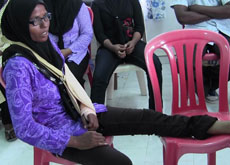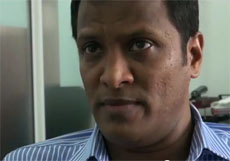The new government of President Dr Mohamed Waheed Hassan has abolished the Presidential Commission, created by former President Nasheed to investigate corruption and human rights abuses under Maumoon Abdul Gayoom.
On February 1, a week before Nasheed’s government was toppled by opposition demonstrators and mutinous police, the Presidential Commission had forwarded a case for prosecution against Gayoom’s half brother MP Abdulla Yameen, for his alleged involvement in an illegal oil trade of up to US$800 million with the Burmese military junta, during his time as chairman of the State Trading Organisation (STO).
Yameen has publicly dismissed the allegations on several occasions, distancing himself from the Singapore branch of the STO where the trade to Burma took place, as well as disputing any illegality in the trade.
Grilled by parliament’s National Security Committee over the matter in November 2011, he denied any involvement in “micro-management” of STO subsidiary companies during his time as chairman until 2005.
The allegations first appeared in February 2011 in India’s The Week magazine, which described Yameen as “the kingpin” of a scheme to buy subsidised oil through STO’s branch in Singapore and sell it through a joint venture called ‘Mocom Trading’ to the Burmese military junta, at a black market premium price.
The article draws heavily on an investigation report by international accountancy firm Grant Thorton, commissioned by the Maldives government in March 2010, which obtained three hard drives containing financial information detailing transactions from 2002 to 2008. No digital data was available before 2002, and the paper trail “was hazy”.
As well as the four shareholders, former Managing Director of STO Singapore Ahmed Muneez served as director. The Week reported that Muneez informed investigators that Mocom Corportation was one of four companies with a tender to sell oil to the Burmese junta, alongside Daewoo, Petrocom Energy and Hyandai.
Investigators learned that Mocom Trading was set up in February 2004 as a joint venture and had four shareholders: Kamal Bin Rashid, a Burmese national, Maldivians Fathimath Ashan and Sana Mansoor, and a Malaysian man named Raja Abdul Rashid Bin Raja Badiozaman. Badiozaman was the Chief of Intelligence for the Malaysian armed forces for seven years and a 34 year veteran of the military, prior to his retirement in 1995 at the rank of Lieutenant General.
Under the contract, wrote The Week, “STO Singapore was to supply Mocom Trading with diesel. But since Mocom Corporation held the original contact, the company was entitled to commission of nearly 40 percent of the profits.”
That commission was to be deposited in a United Overseas Bank account in Singapore, “a US dollar account held solely by Rashid. So, the books would show that the commission was being paid to Mocom, but Rashid would pocket it.”
Yameen has previously described the allegations as “absolute rubbish”, and denied being under investigation by the Singaporean police saying that he had friends in Singapore who would have informed him if that were the case.
The article, he said, was part of a smear campaign orchestrated by Nasheed, a freelance writer and the dismissed Auditor General “now in London”, who he claimed had hired the audit team – “they spent two weeks in the STO in Singapore conducting an investigation.”
Gayoom also lashed out at comments made by the Presidential Commission, that top-level officials from the former administration were involved in blackmarket oil deals with the Burmese military junta.
Today President Waheed’s Press Secretary, Masood Imad, confirmed the Presidential Commission had been abolished but said he was unsure of the reasons why.

